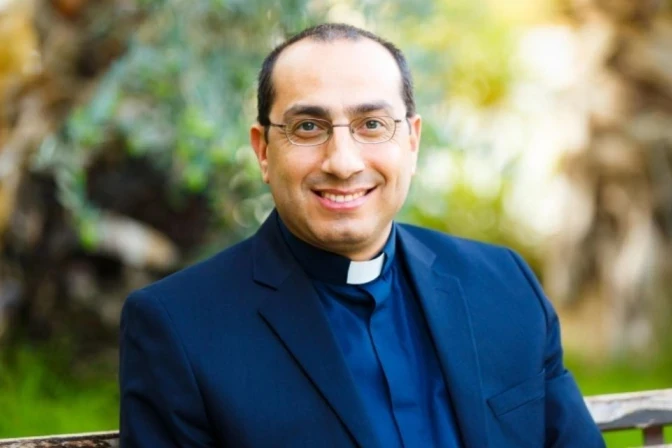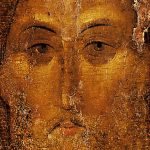
ACI Prensa Staff, Sep 11, 2025 / 17:57 pm (CNA).
In response to Tuesday’s airstrike by the Israeli air force against the Hamas leadership in Doha, the capital of Qatar, the auxiliary bishop of the Patriarchal Diocese of Jerusalem of the Latins for Jordan, Iyad Twal, advocated for a two-state solution to achieve peace in the Middle East.
Twal’s proposal aligns with what the Vatican’s Dicastery for Communication called for in late July in an editorial by its director, Andrea Tornielli, who advocated for the recognition of a Palestinian state amid the conflict between Israel and Hamas.
“The alternative would be to build a state like in South Africa, that is, an apartheid state. But the land is very small. Either we live together, or there is no real solution,” Twal said, pointing out that the two-state solution, “as indicated in the 1970s with U.N. resolutions,” is the only way to live in peace.
However, the Latin patriarch of Jerusalem, Cardinal Pierbattista Pizzaballa, stated in October 2024 that the two-state solution is “unrealistic” for ending the war.
“My impression is that no one wants a wider conflict, but no one is able to stop it,” he said.
“Everything is possible, both positively and negatively. Now you need something new, creative, I don’t know what, but all the previous agreements, ideas, the prospective two-state solution; everything is not realistic now,” the cardinal said at the time.
The Israeli airstrike in Doha
In Rome for a formation course for new bishops, the auxiliary bishop told the pontifical news agency Fides that what happened in Doha is “bad news.”
“Wars in the history of humanity are a tremendous evil, and we don’t learn. Every day we try to find hope, but unfortunately, events contradict us,” Twal said.
He also noted that the airstrike could sabotage efforts to find “a solution to the conflict” and is “a violation of international law.”
“The entire world must understand that there is no justice for all in the Middle East and that we cannot continue living like this,” he said.
Twal noted that Pizzaballa has also pointed out that the violence in the region is driven by Satan’s desire to rule where Jesus lived, although he added that Middle Eastern Christians believe “in justice and in God’s love for all of us. This gives us hope every day, despite the harsh reality we live in.”
“We continue to pray and trust in the possibility of living together. I regret that this is happening while I am far from my people, in Rome, but I feel the support of the other bishops, our brothers in the faith. Here you can breathe the spirit of the Catholic Church, which is truly universal … they pray with us for peace,” he added.
The prelate also noted that religion in the Middle East “can be an element of peace, but also of war.” The region’s religions, according to Twal, “are part of the problem and the solution.”
“The challenge begins with the concept of the state: We have not yet managed to separate state and religion as in Europe. But how can we live our religious differences from the perspective of citizenship, rights, and justice if we continue to say, ‘My God is the only true one and gives me every justification for my actions?’” he said.
“That is fanatical thinking. Instead, faith, and I say this as a bishop, calls me to live justice for all, respecting human dignity,” he added.
The Church in Jordan
Faced with the regional conflict, Twal said young Jordanians live “with profound pain” and insistently ask themselves: “Where is God?”
“It is an existential question that is also a temptation, but at the same time it is an opportunity to come closer to peace,” he continued. “We must ask ourselves: I, a young person, I am not a ruler, how can I make peace live in my heart, even before it becomes a reality among the nations?”
Twal reiterated that Christians in the Middle East “are called to live peace personally, to be witnesses of it in society. In Jordan, thank God, the Catholic Church is committed to this not only internally but also with our Muslim brothers and sisters living in the country.”
The bishop described Jordan as “an oasis of peace, where we live in dialogue with everyone: from the king to the least of us, everyone tries to help.”
“We have supported our Christian brothers and sisters in Gaza, the West Bank, and Palestine. The more we are disappointed by armed conflicts, the more we are committed to helping those who suffer,” he emphasized.
This story was first published by ACI Prensa, CNA’s Spanish-language news partner. It has been translated and adapted by CNA.
If you value the news and views Catholic World Report provides, please consider donating to support our efforts. Your contribution will help us continue to make CWR available to all readers worldwide for free, without a subscription. Thank you for your generosity!
Click here for more information on donating to CWR. Click here to sign up for our newsletter.














